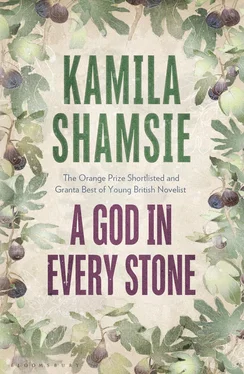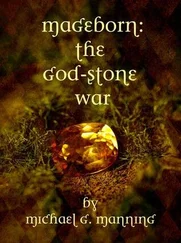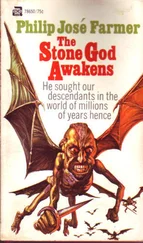And then, they don’t ask about Najeeb Gul. They are here to tell her about the lorries, tell her what she already knows. It’s as if they want her forgiveness for the crimes of their people. How little her grief means to them if they can come here seeking a salve for their own conscience. Where is Diwa? That is the only question in the world. She pushes the frock-coat into the man’s arm and steps out of the room.
The cook is in the study on the other side of the door, a gun in his arms. What do they want, he asks, and before she can answer all the weight of a tall man crashes against the door.
— Najeeb! Where is my brother? Najeeb!
His body is a battering ram against the heavy wood door. The cook holds the rifle in a firing position and tells her to unlock the door and open it.
— No, Zarina says. She hears the glass-eyed man’s sorrow, the agony of it. The echo of her own heart.
— Enough, she says.
In the courtyard, the brothers embrace. They hold each other so close, so uncaring of those who are watching that the cook and his son and Zarina turn their faces away, and then have to look back because joy is something they know they won’t witness again in this household for a very long time.
The Englishwoman says the younger brother’s name, so softly only Zarina, standing beside her, can hear. They are facing each other — the Englishwoman and Najeeb Gul — but his eyes are closed as he grips his brother’s back, his face pressed against the older man’s shoulder. Soon though, he will open his eyes and see the woman studying his face, her hand pressed against her heart.
The Englishwoman pivots on her heel, walks towards the front door. No one but Zarina is watching her. In the doorway she turns, holds up her hand to shoulder height, fingers together, palm facing outwards. Zarina doesn’t know what the gesture means, and yet she finds herself replicating it. The Englishwoman ducks her head in acknowledgement, covers herself in a burqa, and walks out into the street.
In the whisper of pre-dawn which belonged to neither the brothel nor the mosque, Zarina walked through rows and rows of mounds with pebbled borders, wearing the white of mourning. She already knew her way to the three opulent graves with marble-bordered flower beds at the foot of headstones inscribed with Qur’anic verses. These were the graves of the carpet-seller’s parents and his sister, the girl murdered by her husband who could have been Zarina’s husband too. Beside them, a mound of packed mud carpeted in rose petals. Hundreds, thousands of rose petals which Diwa’s father and brothers had poured onto the mud. So many they had become something other than rose petals — a stilled red river between tombs, the ripped wing of an angel fallen to earth.
Zarina knelt, lifted up handfuls of petals, and moved them to one side. Her trowel bit down into the grave. She kept on for a few minutes, slicing the earth. When the hole was large and deep enough she placed the turban within it, its dried blood Diwa’s only remains. Carefully, she covered it up again, stood, bent towards the rose petals and scooped up a handful of the warm, fleshy licks of red. By this time next year she’d have a child; she was certain it would be a girl. She’d call her Diwa and when the child was old enough she’d bring her here and tell her about the turban and the metal band of figs. And perhaps one day they’d dig them up together and the world would hear the story of Diwa — not an angel sent by Allah to give water to thirsty men but a girl, unafraid, shot down by the English and disposed of by the men who shouted ‘Freedom’.
The breeze stirred the petals and it was as if she were holding a tiny creature in her hands. She threw her arms up in the air, a great expansive gesture, and watched the fledgling take to the sky.
Where are the monstrous races he promised? The Shadow-Footed Men who lie down at midday and raise up their broad feet to make a shadow within which they can escape the sun? The Once-Engendering Men with semen as black as their skin? The Mouthless Men who live off the scent of plants? Atossa, widow of Darius, leans over the prow of the ship, looking into the muddy waters of the Indus’ tributary. And the fish-tailed lions, the spiny mermaids, the giant white worms? The ants who dig up gold? Lies, always lies with Scylax.
Along the banks of the river the Pactyike stand with spears in hand, heads bowed as the Persian ships sail past. The water-carrying ship draws up alongside and one of Atossa’s attendants holds out an empty urn into which the priest pours the water of the sacred river Choaspes. A few drops, silver with sun and divinity, fall into the river which shimmers to receive them. The water is calm, the priest’s hand famed for its steadiness. The unsalted water of the Indus is sacred enough for everyone but her, and some of the attendants whisper that it is sweeter than Choaspes, but even so they will all, even the priest, do what they can to have some share of that which is permitted only to the Queen. Everywhere, everywhere betrayal. This is the price of power.
At Caspatyrus she disembarks, and waves away all offers of food and rest.
— Bring him to me.
He is old now, his skin so leathered and creased he could be one of the monstrous races he wrote about. But he still looks at her as he always did as though she isn’t really his queen no matter the words on his lips, the curve of his neck as he kneels in front of the gold and lapis-lazuli throne which four Pactyike men had carried from her ship to this grove of pomegranate trees.
— The Queen honours me. All this travel, for me?
— I’ve always wanted to see the Indus. Now there is peace in our kingdom, and my son is on the throne, it seemed the right time. You are incidental.
He smiles at the lie. She sent her best men to capture him, with instructions that he must be kept alive and brought to her. But when the message arrived to say he had been found in Caspatyrus and was too sick to survive the journey to Persepolis it was very clear what she had to do. Though looking at him now it’s clear he isn’t sick at all, just still able to convince his listeners of everything he has to say.
— Did you think you could hide from me here, Carian?
— Hide? No. I grow sentimental in my old age. I wanted to retrace the happiest footsteps I’ve ever taken. You were not part of my calculation.
— And who allowed you those happy footsteps? Who trusted a man of Caria? Who placed a circlet on the brow of a barbarian?
— A man wise enough to recognise that I would do exactly what he asked of me in return.
A smashed pomegranate lies near the throne. Rubies strewn at her feet in pools of blood.
— Where is the Circlet?
— Why?
— I want it back. That’s why I’ve come.
— I don’t have it.
— Why did you do it, after everything Persia had given you?
This is the real question, the only one in the world which eludes her understanding. Why did Scylax of the Fig Circlet, Scylax the Entrusted, choose to risk the wrath of Darius by writing a glorified account of the life of that Carian rebel, Heraclides, raising his ambush of the Persians to a victory greater than any of Darius or Cyrus? It had achieved nothing in the end; Caria was brought back under control, Heraclides was killed. So, why?
— Because I loved Heraclides.
— What kind of answer is that? What about Caria? What about Persia?
— Continents are cut up this way, and that way. Islands extend themselves across seas and mountains. What is any of that when compared to Heraclides?
The exhaustion of the journey has finally seeped into her marrow. She looks around at the chains of mountains, the bright green grass, the rivers and fruit-laden trees. Mountain ranges and valley together form the broken bowl of an artist, its base smeared with thick paints of green and blue and red. He didn’t lie about that.
Читать дальше












